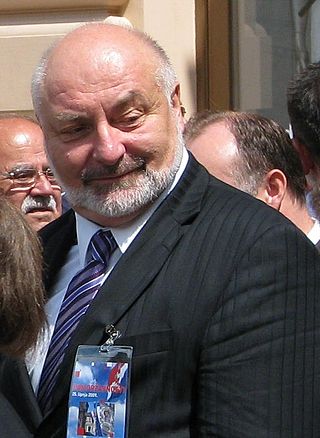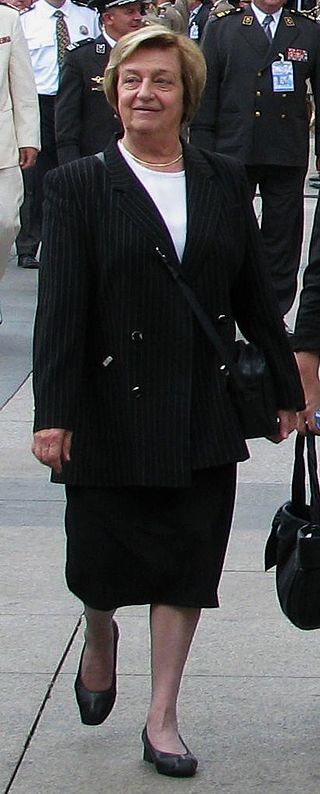
Ivo Sanader is a Croatian former politician who served as Prime Minister of Croatia from 2003 to 2009. He is currently serving a 18-year prison sentence for corruption in Lipovica prison.

The Croatian Democratic Union is a major conservative, centre-right political party in Croatia. Since 2016, it has been the ruling political party in Croatia under the incumbent Prime Minister Andrej Plenković. It is one of the two major contemporary political parties in Croatia, along with the centre-left Social Democratic Party (SDP). It is currently the largest party in the Sabor with 55 seats. The HDZ governed Croatia from 1990 before the country gained independence from Yugoslavia until 2000 and, in coalition with junior partners, from 2003 to 2011, and since 2016. HDZ is a member of the Centrist Democrat International, International Democracy Union, and the European People's Party, and sits in the European People's Party Group in the European Parliament. HDZ is the first political party in Croatia to be convicted of corruption.

The Croatian Party of Pensioners is a Croatian centre-left political party that is currently led by Veselko Gabričević.
This is the history of Croatia since the end of the Croatian War of Independence.

Presidential elections were held in Croatia in January 2005, the fourth such elections since independence in 1991. They were the first presidential elections held after the constitutional changes of November 2000, which replaced a semi-presidential system with an incomplete parliamentary system, greatly reducing the powers of the President in favor of the Prime Minister and their cabinet. Incumbent president Stjepan Mesić, who had been elected in 2000 as the candidate of the Croatian People's Party, was eligible to seek reelection to a second term and ran as an independent as the constitution prohibits the President from holding party membership while in office.

Jadranka Kosor is a Croatian politician and former journalist who served as Prime Minister of Croatia from 2009 to 2011, having taken office following the sudden resignation of her predecessor Ivo Sanader. Kosor was the first and so far only woman to become Prime Minister of Croatia since independence.

Ivan Šimonović is a Croatian diplomat, politician and law scholar. In October 2008 he was appointed Justice Minister of Croatia. On 3 May 2010, Šimonović was appointed UN Assistant Secretary-General for Human Rights. As of 1 October 2016, Šimonović has been appointed as the Secretary-General’s Special Adviser on the Responsibility to Protect.

Božidar Kalmeta is a Croatian politician and member of the Croatian Democratic Union (HDZ) party. From 2003 to 2011 he served in the Croatian Government as Croatia's Minister of the Sea, Transport and Infrastructure under HDZ prime ministers Ivo Sanader and Jadranka Kosor.

Gordan Jandroković is a Croatian diplomat and politician serving as Speaker of the Croatian Parliament since 2017. He previously served as Minister of Foreign Affairs and European Integration from 2008 to 2011, and as Deputy Prime Minister from 2010 to 2011 in the cabinets of prime ministers Ivo Sanader and Jadranka Kosor.

Slobodan Uzelac is a Croatian Serb politician who served as Deputy Prime Minister of Croatia for Regional Development, Reconstruction and Return in the second cabinet of Prime Minister Ivo Sanader and his successor in that position Jadranka Kosor. He is the first member of the Serb minority in Croatia to hold a cabinet position since the first Croatian multi-party elections were held in 1990.

Marina Matulović-Dropulić is a Croatian politician who served as Minister of Spatial Planning, Construction and Housing in the cabinet of prime Minister Zlatko Mateša from 1995 until 1996, and as Minister of Construction, Spatial Planning and Environment in the two cabinets of Ivo Sanader from 2003 until 2009, as well as the cabinet of Jadranka Kosor until 2010. Furthermore, Matulović-Dropulić served as the 49th Mayor of Zagreb, becoming the first woman in the city's history to hold that post. She was initially appointed to the post in 1996 by President Franjo Tuđman, who had refused to appoint four other candidates elected by the city council to serve as the mayor, an incident known as the Zagreb crisis. She was once more elected mayor in 1997 and served until 2000. She is a member of the Croatian Democratic Union party.

The Ninth Government of the Republic of Croatia was the first of two Croatian Government cabinets led by Prime Minister Ivo Sanader. It was announced on 23 December 2003 and its term ended on 12 January 2008. All but two cabinet members came from the ruling Croatian Democratic Union (HDZ) party, following their win in the 2003 parliamentary elections.

Damir Polančec is a Croatian politician who served as Minister of Economy, Labour and Entrepreneurship from 2008 to 2009, and as Deputy Prime Minister of Croatia from 2005 to 2009, in the cabinets of two prime ministers, Ivo Sanader and Jadranka Kosor.

Božo Biškupić is a Croatian politician and lawyer. He served as Minister of Culture of Croatia in the governments of three Croatian Prime Ministers: Zlatko Mateša (1995–2000), Ivo Sanader (2003–2009) and Jadranka Kosor (2009–2010). Therefore his two non-consecutive ministerial terms amount to a total of 11 years and 87 days, the longest tenure of any minister in a Croatian Government since independence in 1991.

Parliamentary elections were held in Croatia on Sunday, 4 December 2011 to elect 151 members to the Croatian Parliament. They were the sixth parliamentary election in Croatia since independence.

The Tenth Government of the Republic of Croatia was the second of two Croatian Government cabinets led by Prime Minister Ivo Sanader. It was announced on 12 January 2008 and its term ended on 6 July 2009, when Jadranka Kosor formed the 11th cabinet following Sanader's surprise resignation. Cabinet members represented parties of the ruling coalition which was formed following the 2007 parliamentary elections:

Tomislav Karamarko is a Croatian politician who served as First Deputy Prime Minister of Croatia from January to June 2016. He served in the Cabinet of Jadranka Kosor as Minister of the Interior from 2008 to 2011.
Ana Lovrin, is a Croatian politician. She held the post of Minister of Justice in the first and second cabinets under Prime Minister Ivo Sanader, from February 2006 to October 2008. She was the third female holder of that office, as well as being the third consecutive woman after Ingrid Antičević-Marinović and Vesna Škare-Ožbolt.
Since its founding in 1989, elections within the Croatian Democratic Union were held numerous times.

Davor Ivo Stier is a Croatian-Argentine politician and diplomat serving as member of the European Parliament since July 2024, having previously served from 2013 to 2016. He was a member of the Croatian Parliament in multiple terms, as well as the Minister of Foreign and European Affairs and Deputy Prime Minister of Croatia from 2016 to 2017.



















